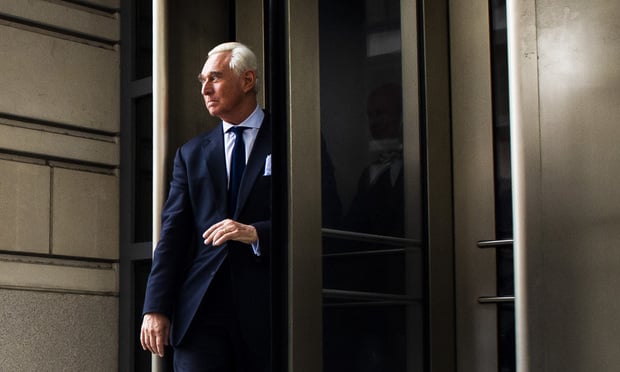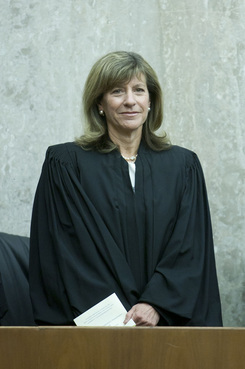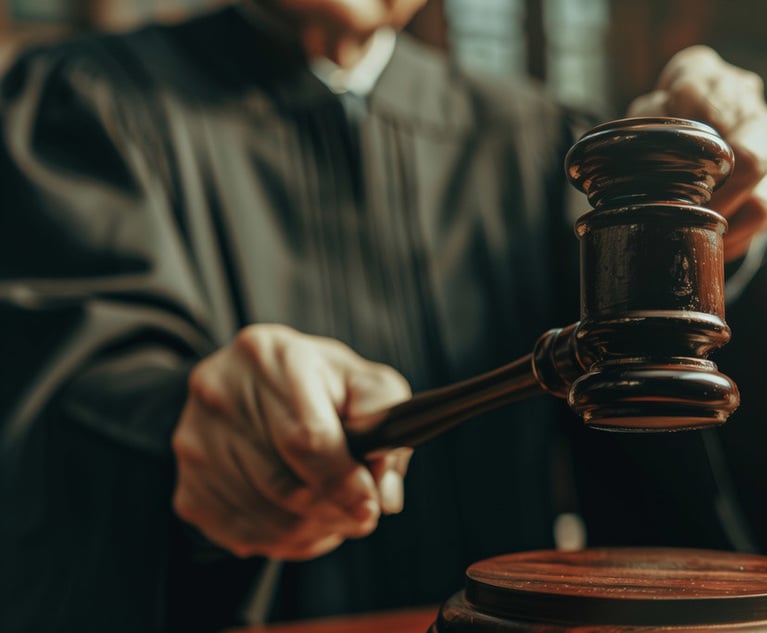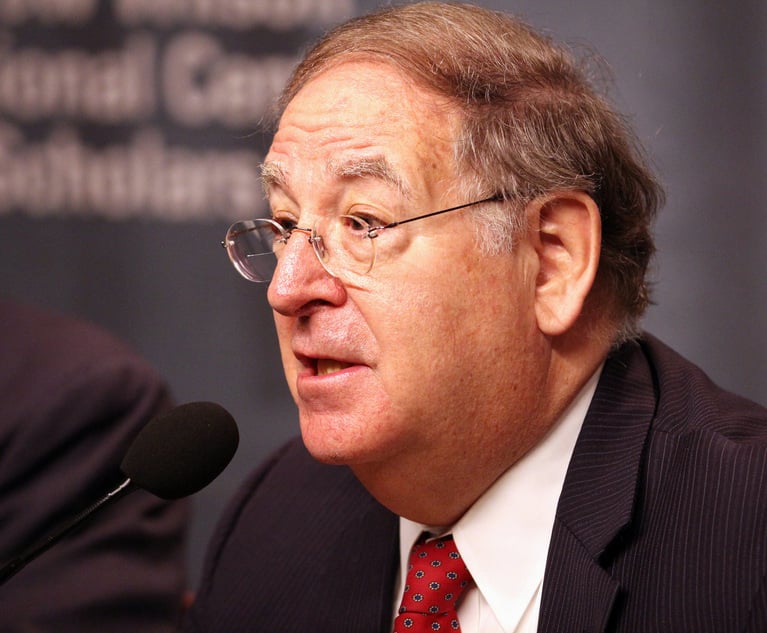'Completely Failed': Judge Rules Against Roger Stone Again, Rejecting Motion to Suppress Evidence
U.S. District Judge Amy Berman Jackson found that the ex-Trump campaign adviser 'has not come close' to reaching the legal standard to dispute search warrants in his case.
September 24, 2019 at 02:00 PM
5 minute read
 Former Trump adviser Roger Stone, indicted by the team of Special Counsel Robert Mueller, departs Federal Court after attending his arraignment hearing, where he pleaded not guilty, in Washington, D.C., on Jan. 29. Photo: Diego M. Radzinschi/ALM
Former Trump adviser Roger Stone, indicted by the team of Special Counsel Robert Mueller, departs Federal Court after attending his arraignment hearing, where he pleaded not guilty, in Washington, D.C., on Jan. 29. Photo: Diego M. Radzinschi/ALM
A D.C. federal district judge has ruled against a motion by Roger Stone over evidence obtained through 18 search warrants issued in his case, finding that the longtime conservative political operative failed to show that the affidavits contained knowingly false statements.
Stone had sought an evidentiary hearing over warrants, alleging that the affidavits used to back the warrant applications included false facts and should be thrown out.
But U.S. District Judge Amy Berman Jackson of the District of Columbia, in an opinion unsealed Tuesday, found that Stone came far short of the benchmark needed to even call the search warrants into question, never mind block the evidence obtained through the warrants.
 U.S. District Court judge Amy Berman Jackson. Photo: Diego M. Radzinschi/ALM
U.S. District Court judge Amy Berman Jackson. Photo: Diego M. Radzinschi/ALMStone provided two statements from cybersecurity experts who claimed it was unlikely that servers for the Democratic National Committee servers were hacked by Russian actors, as found by the private cybersecurity firm Crowdstrike and the U.S. intelligence community.
"But merely conclusory contentions, or suggestions that an affiant was negligent, will not be sufficient to support a request for an evidentiary hearing," Jackson wrote in the new opinion.
Jackson filed the opinion under seal last week, but it was made public after both Stone's lawyers and federal prosecutors said Monday they had no objections to it being unsealed.
In the opinion, Jackson said that Stone needed to show that those who signed the sworn affidavit used for the warrants knowingly made false statements and that those statements were key in a court deciding there was probable cause to issue the warrants.
"In short, defendant must demonstrate that the issuing judge or magistrate was misled. Defendant has not come close to meeting this standard," Jackson wrote.
The judge wrote that the "fundamental problem" with Stone's effort is that he did not identify "any statements in the eighteen affidavits that he claims are deliberately false or were made in reckless disregard for the truth."
"Defendant's original motion completely failed to 'point out specifically the portion of the warrant affidavit that is claimed to be false,' as required" under the legal standard, Jackson wrote, "and it could have been denied on that basis alone."
She continued that Stone's attorneys "endeavored to cure the problem in his reply, but as was apparent at the hearing, his efforts still fall short."
Jackson had pressed the GOP strategist's attorneys during a July hearing over which statements in the affidavits they believed to be knowingly false and not simply based off the findings by Crowdstrike and intelligence officials. The legal team, which is led by attorneys Bruce Rogow and Robert Buschel, struggled to directly answer Jackson's questions at the time.
This ruling is another setback for Stone. Jackson has repeatedly ruled against him in court proceedings ahead of his November trial. She last month rejected Stone's motion to dismiss the charges against him.
The judge also slapped Stone with a gag order earlier this year after he posted an image on Instagram depicting Jackson on the bench with a crosshairs in the corner. She tightened that gag order in July, blocking Stone from posting on Instagram, Facebook and Twitter after she determined that he had violated the terms of the order through Instagram posts that referenced filings in his case.
However, Jackson did hand Stone a partial win by ruling last month that he could view some redacted parts of Mueller's report that referred to him and his case.
Stone's attorneys are scheduled to come face-to-face with Jackson in federal court in D.C. this week, at a Wednesday morning pretrial conference.
Read more:
Roger Stone Doesn't Want DC Jury to Learn About His Trump Campaign Contacts at Upcoming Trial
Did a Roger Stone Filing Just Reveal a Cellphone Number for President Trump?
Judge Blames Roger Stone for Roger Stone's Problems, Refuses to Dismiss Charges
Roger Stone's Lawyers Were in Court Today. It Didn't Go Well
This content has been archived. It is available through our partners, LexisNexis® and Bloomberg Law.
To view this content, please continue to their sites.
Not a Lexis Subscriber?
Subscribe Now
Not a Bloomberg Law Subscriber?
Subscribe Now
NOT FOR REPRINT
© 2025 ALM Global, LLC, All Rights Reserved. Request academic re-use from www.copyright.com. All other uses, submit a request to [email protected]. For more information visit Asset & Logo Licensing.
You Might Like
View All
Who Are the Judges Assigned to Challenges to Trump’s Birthright Citizenship Order?

‘Undermines the Rule of Law’: Retired US Judges Condemn Trump’s Jan. 6 Pardons

'If the Job Is Better, You Get Better': Chief District Judge Discusses Overcoming Negative Perceptions

'Thoughtful Jurist': Maryland US District Senior Judge Messitte Dies After Short Illness
4 minute readTrending Stories
- 1Morgan Lewis Says Global Clients Are Noticing ‘Expanded Capacity’ After Kramer Merger in Paris
- 2'Reverse Robin Hood': Capital One Swarmed With Class Actions Alleging Theft of Influencer Commissions in January
- 3Hawaii wildfire victims spared from testifying after last-minute deal over $4B settlement
- 4How We Won It: Latham Secures Back-to-Back ITC Patent Wins for California Companies
- 5Meta agrees to pay $25 million to settle lawsuit from Trump after Jan. 6 suspension
Who Got The Work
J. Brugh Lower of Gibbons has entered an appearance for industrial equipment supplier Devco Corporation in a pending trademark infringement lawsuit. The suit, accusing the defendant of selling knock-off Graco products, was filed Dec. 18 in New Jersey District Court by Rivkin Radler on behalf of Graco Inc. and Graco Minnesota. The case, assigned to U.S. District Judge Zahid N. Quraishi, is 3:24-cv-11294, Graco Inc. et al v. Devco Corporation.
Who Got The Work
Rebecca Maller-Stein and Kent A. Yalowitz of Arnold & Porter Kaye Scholer have entered their appearances for Hanaco Venture Capital and its executives, Lior Prosor and David Frankel, in a pending securities lawsuit. The action, filed on Dec. 24 in New York Southern District Court by Zell, Aron & Co. on behalf of Goldeneye Advisors, accuses the defendants of negligently and fraudulently managing the plaintiff's $1 million investment. The case, assigned to U.S. District Judge Vernon S. Broderick, is 1:24-cv-09918, Goldeneye Advisors, LLC v. Hanaco Venture Capital, Ltd. et al.
Who Got The Work
Attorneys from A&O Shearman has stepped in as defense counsel for Toronto-Dominion Bank and other defendants in a pending securities class action. The suit, filed Dec. 11 in New York Southern District Court by Bleichmar Fonti & Auld, accuses the defendants of concealing the bank's 'pervasive' deficiencies in regards to its compliance with the Bank Secrecy Act and the quality of its anti-money laundering controls. The case, assigned to U.S. District Judge Arun Subramanian, is 1:24-cv-09445, Gonzalez v. The Toronto-Dominion Bank et al.
Who Got The Work
Crown Castle International, a Pennsylvania company providing shared communications infrastructure, has turned to Luke D. Wolf of Gordon Rees Scully Mansukhani to fend off a pending breach-of-contract lawsuit. The court action, filed Nov. 25 in Michigan Eastern District Court by Hooper Hathaway PC on behalf of The Town Residences LLC, accuses Crown Castle of failing to transfer approximately $30,000 in utility payments from T-Mobile in breach of a roof-top lease and assignment agreement. The case, assigned to U.S. District Judge Susan K. Declercq, is 2:24-cv-13131, The Town Residences LLC v. T-Mobile US, Inc. et al.
Who Got The Work
Wilfred P. Coronato and Daniel M. Schwartz of McCarter & English have stepped in as defense counsel to Electrolux Home Products Inc. in a pending product liability lawsuit. The court action, filed Nov. 26 in New York Eastern District Court by Poulos Lopiccolo PC and Nagel Rice LLP on behalf of David Stern, alleges that the defendant's refrigerators’ drawers and shelving repeatedly break and fall apart within months after purchase. The case, assigned to U.S. District Judge Joan M. Azrack, is 2:24-cv-08204, Stern v. Electrolux Home Products, Inc.
Featured Firms
Law Offices of Gary Martin Hays & Associates, P.C.
(470) 294-1674
Law Offices of Mark E. Salomone
(857) 444-6468
Smith & Hassler
(713) 739-1250








